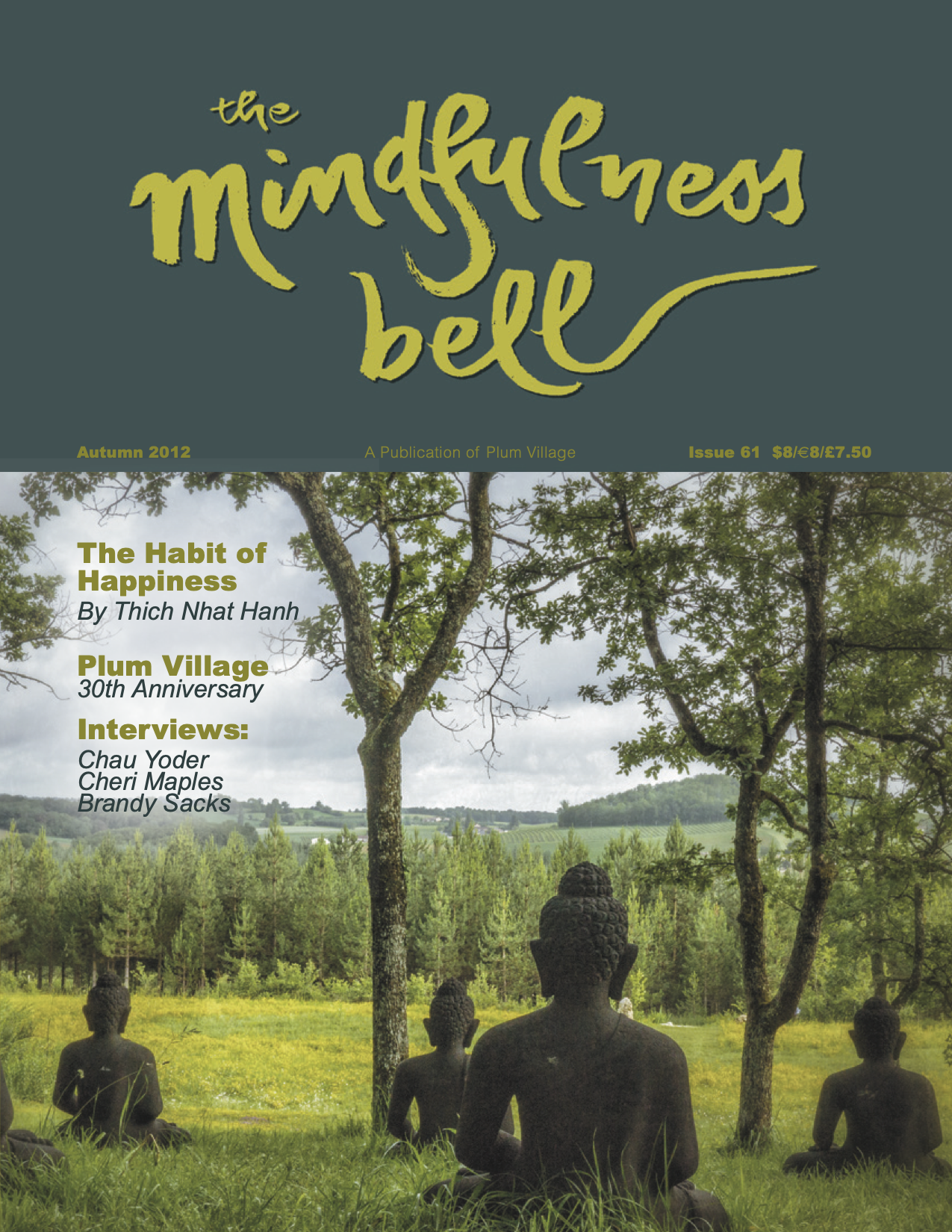By Sister Thoai Nghiem
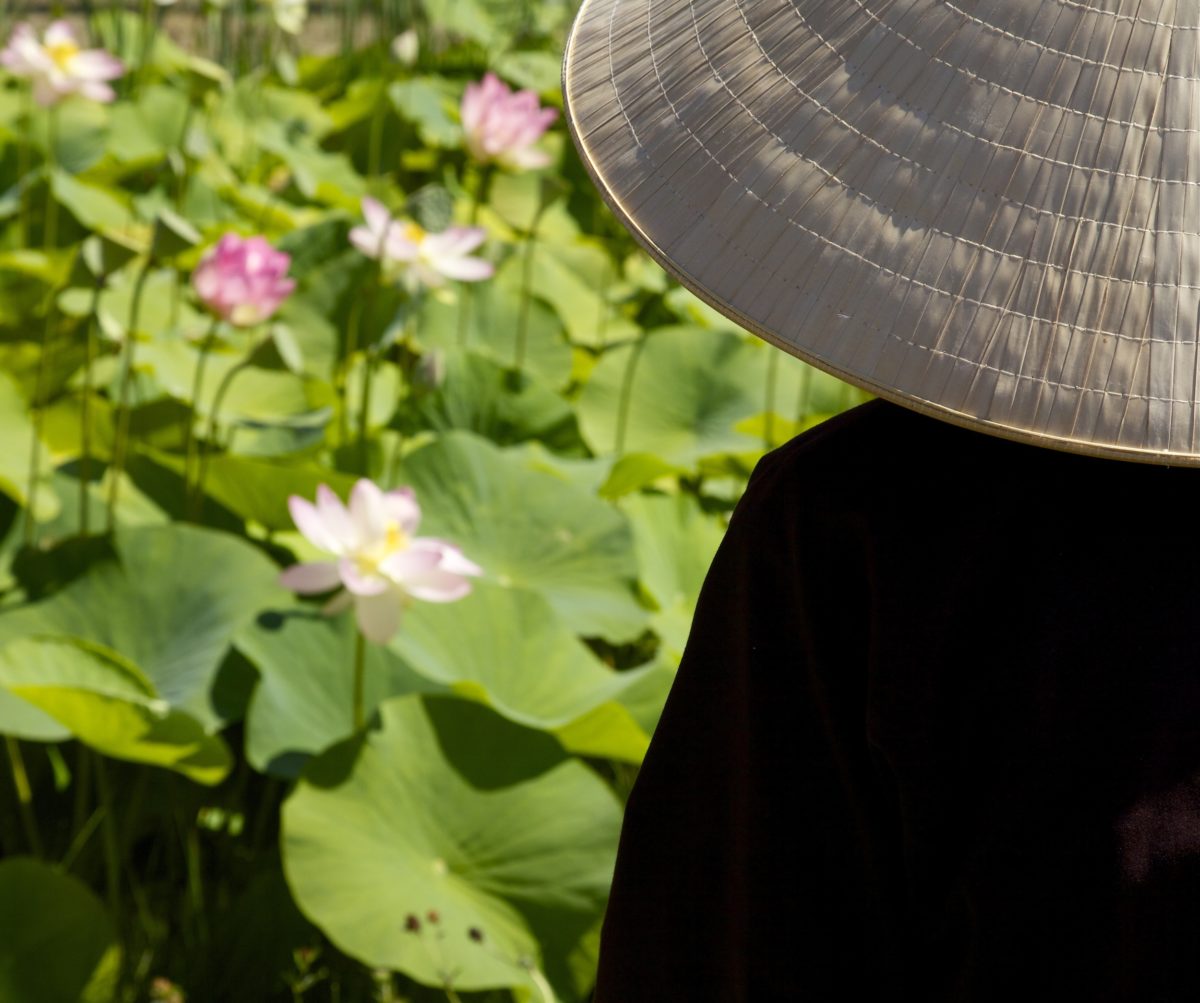
They’re always beautiful, the good old days. Each time someone asks me about the old days, I am perplexed, saying “umm” and “ahh,” but once I start, I often run out of time. Our memories, when we touch them, vibrate as a musical note echoing in the vast silence.
I can see the images of those days…
Plum Village Memories
By Sister Thoai Nghiem

They’re always beautiful, the good old days. Each time someone asks me about the old days, I am perplexed, saying “umm” and “ahh,” but once I start, I often run out of time. Our memories, when we touch them, vibrate as a musical note echoing in the vast silence.
I can see the images of those days…
Plum Village Memories
Those days, our beds were slats of wood placed on four bricks in a cement-floor room with unpainted walls, without a heater, and the winter wind freely slipped in, freezing cold.
Those days, everyone was wearing a pair of wooden clogs because everywhere was muddy. Some lay practitioners, after returning home from Plum Village, would try to look for a pair of clogs because they thought it was a fashion at Plum Village. Some left with a chunk of mud as the village token. On the day when Lower Hamlet had to lay gravel on the path around the dining hall so that firefighters’ trucks could drive there according to the law, I looked at the new white path reflecting the sunshine and felt like I had just lost something very precious. It was a little bit like civilization had come to a remote rural area, and I became someone who missed the good old days.
Those days, Dharma talks in the Lower Hamlet were given in the dining hall. Every fifteen minutes, teacher and disciples stopped to breathe and listen to the clock chime. The stove was placed at the end of the hall. Anyone who cooked could secretly chop and peel vegetables if they were not spotted by Thay.
Those days, the kitchen in Upper Hamlet had a top level, which was the dining hall. Going there to eat or for Dharma sharing, when standing up, you would have to bend your head since the pillars and rafters were so low.
Those days, in the Violet Cloud building, only Thay’s room was unchanged. It used to be the cow shed. Sister Tu Nghiem’s room is a common room now; Sister Hieu Nghiem’s is Sister Chan Khong’s now. The office was a library, and the rest of the upstairs space was for storage of miscellaneous things and/or straw.
Those days, each summer, Vietnamese would be heard all over the Lower Hamlet, where there was a festive atmosphere. Wooden slats and bricks were carried from here to there to build beds. At the end of summer, a row of plastic containers full of soiled bed linens was waiting to be washed by hand. Often I jumped inside the container to wash by feet.
Those days, almost every week, Thay would teach us chanting and ho canh. However, nine out of ten people would chant in different melodies.
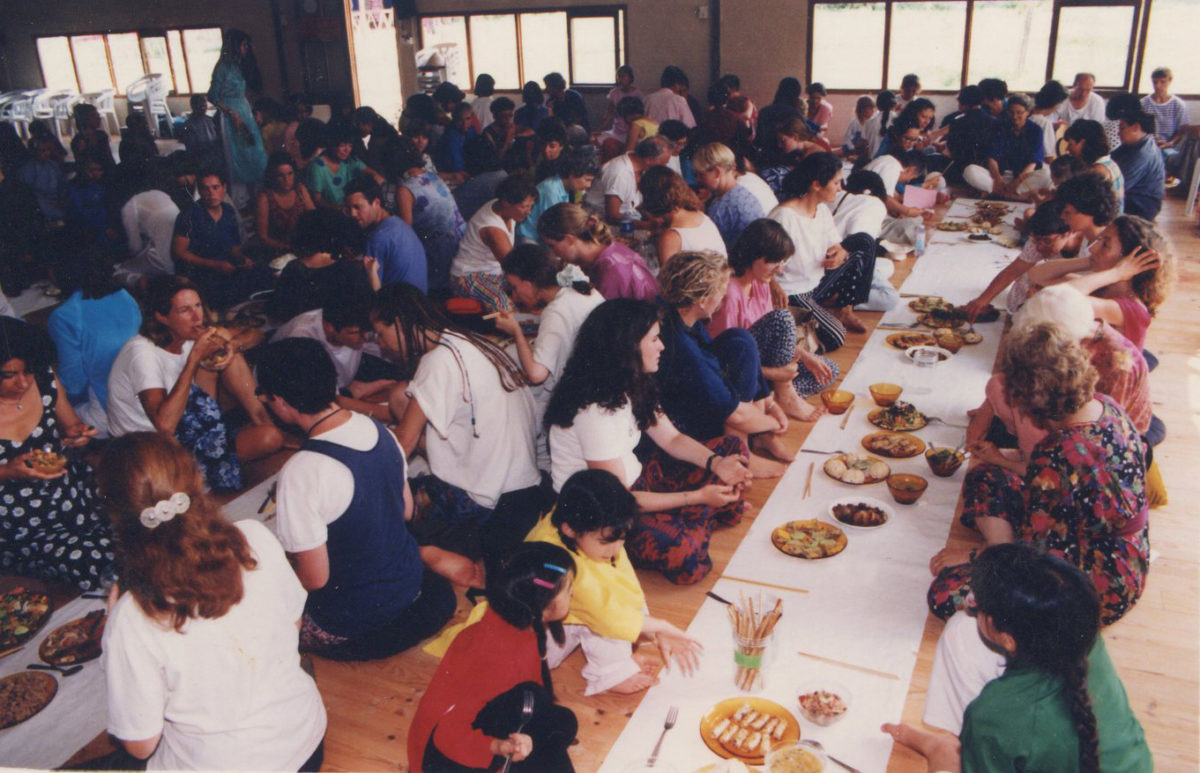
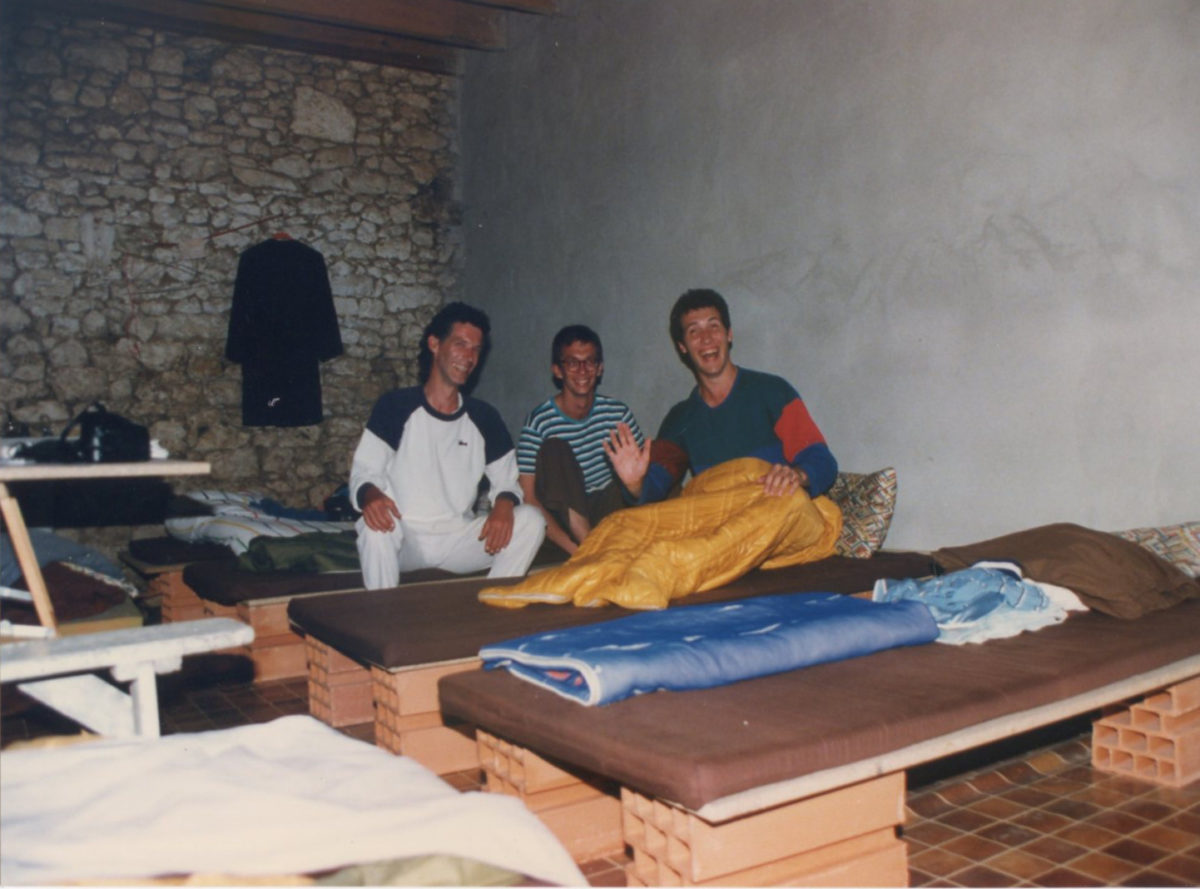
Transforming Mind and Body
Those days, Thay constantly introduced new practices with which we hardly could keep up. Our personal practice was still not good enough, so Thay had to find out new practices to help us transform our mind and body.
Those days, Thay organized a Dharma festival. When each person heard his or her name called, he or she had to go in front of the Sangha, breathe in and out three times, and pick a small piece of paper with a topic from the bell. Then that person had to talk about the selected topic for ten minutes. Some were freaked out, a few were quite articulate, and others burst into tears.
Those days, Upper Hamlet only had one blue van for shopping. The side door would not close properly. It was very nice to sit in there because when the van climbed uphill, the door would slowly open, allowing the wind to blow in, just like boarding a xe loi in Vietnam (very similar to a rickshaw, being pulled by a motorbike instead of a person).
Those days, Lower Hamlet only had an old car, donated by uncle Cao Thai. Sister Hieu Nghiem was the only driver since no one else could drive a manual car.
Those days, I wandered around the whole day in the forest because the schedule was very relaxed except on a Day of Mindfulness. In the autumn I picked apples and hazelnuts and gathered wood for the fireplace in the dining hall. In the spring I hung a hammock under the plum trees and fell asleep.
Those days, all novices wore grey robes. Thay loved the memories of his novice time, so one day Thay came into the meditation hall wearing a grey robe.
Those days, bikkhus wore brown robes. Bikkhunis and novice nuns could wear only brown robes during retreats. When there was an announcement on the board about putting on sanghati, the sisters would ask each other what color robe to wear.
Those days were nearly twenty years ago. I was still very clumsy; it took me nearly half an hour each time I shaved my head. I was still up and down due to little-things-that-seem-to-be-very big happening in the Sangha. I still got very excited like a child receiving a gift each time I had a chance to play/be with Thay. I still worried about Thay’s fragile health because I was such a baby stumbling on my feet. I still anxiously wondered how Plum Village would be without Thay.
Those days, Thay talked about Vietnam, or the root temple, or the traditional protocols from when Thay was still a novice, without expecting that one day he would be able to set foot in his homeland. And I sat there, listening with a soft heart. I loved Vietnam, loved those intelligent novices who were very keen in learning and practicing, loved my beloved Dharma sisters and brothers whom I had never met, and who were trying to preserve the Buddhist conduct in Vietnam.
Inheriting the Fruits
Now, Thay has been able to go back to our homeland, although his returns were full of difficulties and challenges. I too have gotten to know Vietnam. I was there for more than four years, living in a traditional temple and being close to the root temple.
Now, Plum Village has turned thirty years old. Ten years is long enough for a child to mature; thirty years is sufficient for a newborn baby to become a well-established adult in society. And the children of Plum Village—Upper Hamlet, Lower Hamlet, New Hamlet, Maison de l’Inspire, Deer Park, Green Mountain, Blue Cliff, Magnolia Grove, EIAB, AIAB—although being born in different times, have already started to stand firmly on two feet, self-sufficient and contributing peace to the world.
In the early days of Thay’s Dharma tours, Thay was assisted by just a few lay and monastic Dharma teachers. Today, Thay’s presence is inseparable with the image of a big Sangha and retreats with approximately 1,000 attendees. Not only has Thay conducted Dharma tours, but our young Dharma teachers have also been to many different places to provide teachings. Additionally, various centers have organized many retreats. In recent years, both the Wake Up movement, which has introduced mindfulness to young people in schools and universities, and health retreats have developed strongly and have been very well received. And our very young novices have played a really active role in this work.
At this present time, Thay continues to generate new insight. For many years, the tree of wisdom has flourished and has been fruitful. Now, at the age of eighty-five, Thay has still not stopped. Thay would like us to be solid on the path to renew Buddhism. Thay would like us to bring Thay into the future.
It is the image of an ancient tree that suddenly produces a fragrant flower. How I love this image! The fruits of meditation practice, of daily enlightenment from Thay, have been inherited. And the fragrance will be spreading in countless directions, even if the tree grows against the wind, and regardless of storms.
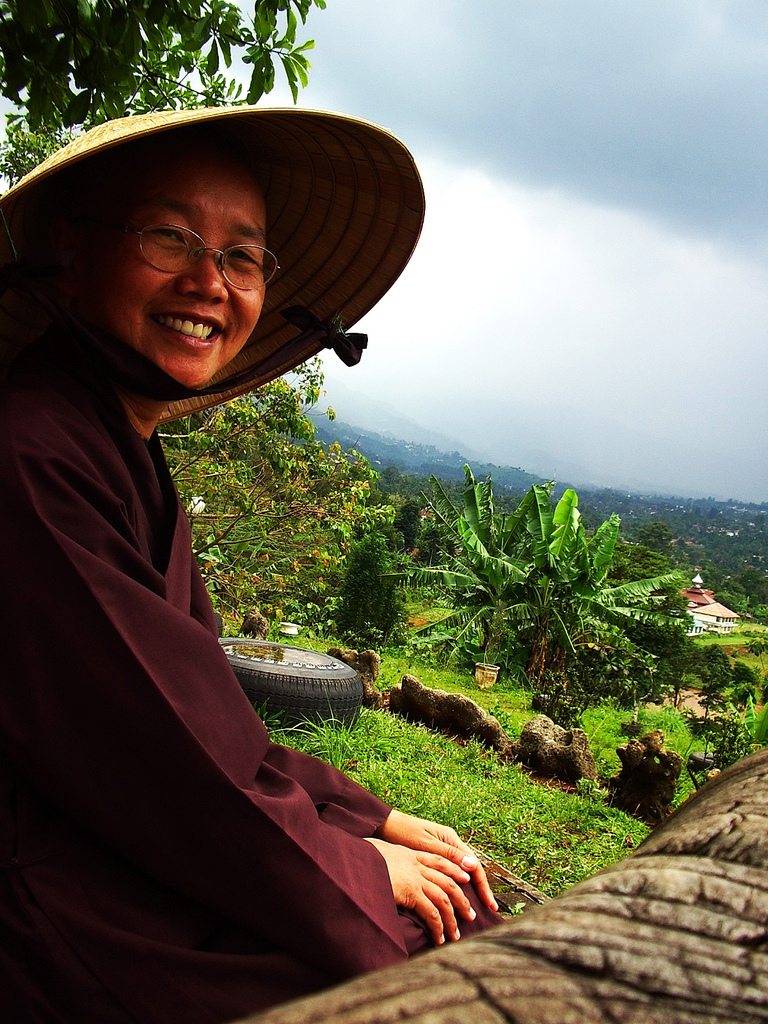
Sister Thoai Nghiem resides in New Hamlet, has been with Plum Village since 1993, and likes to take care of the gardens.

